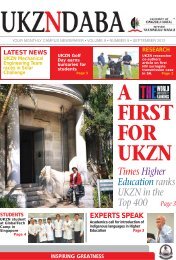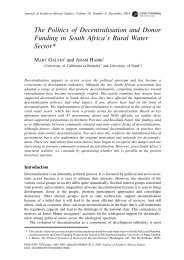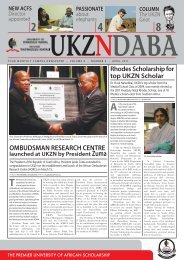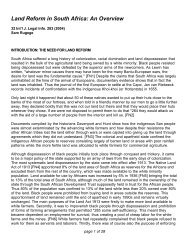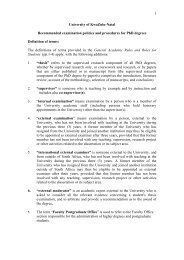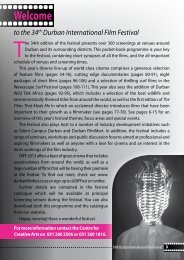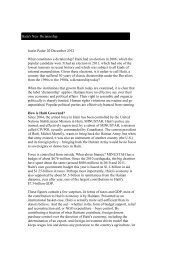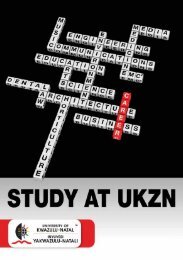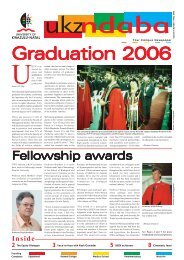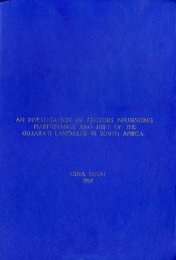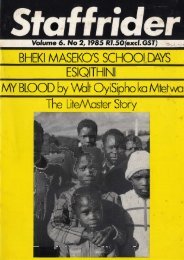universit y of kw azulu-na tal research repor t 2008/2009 - UKZN ...
universit y of kw azulu-na tal research repor t 2008/2009 - UKZN ...
universit y of kw azulu-na tal research repor t 2008/2009 - UKZN ...
- No tags were found...
You also want an ePaper? Increase the reach of your titles
YUMPU automatically turns print PDFs into web optimized ePapers that Google loves.
LEAding RESEARCH CEntRESLEAding RESEARCH CEntRESThe Africa CentreThe African Centre for Crop ImprovementTThe Africa Centre for Health and Population Studies was establishedTin 1997 as an initiative <strong>of</strong> the former University <strong>of</strong> Na<strong>tal</strong> and the SouthTAfrican Medical Research Council with funding from the WellcomeTrust, a United Kingdom-based medical charity.The Centre is based in Somkhele, in the south western part <strong>of</strong> Tthe Umkhanyakude district <strong>of</strong> northern KwaZulu-Na<strong>tal</strong>, with accessResearch at the Centre is multi-discipli<strong>na</strong>ry, using demography,epidemiology, social sciences, clinical, virological, immunological,bio-informatics and data base expertise to build a complex yetcomprehensive and truly exciting <strong>research</strong> portfolio aiming to furtherunderstanding the complex HIV dy<strong>na</strong>mics in this rural population.TThe African Centre for Crop Improvement (ACCI) was established inT2001 to train African plant breeders, in Africa, on African food securityTcrops. It set out to train five cohorts <strong>of</strong> eight plant breeders, startingTwith the first cohort in 2002, with a vision <strong>of</strong> African scientists solvingTAfrica’s food problems. TThe ACCI was initially funded by the Rockefeller Foundation, butdisease and drought tolerance, and improved yields and quality, withthe aim <strong>of</strong> improving food security in 12 African countries, includingEthiopia, Kenya, Mozambique, Zambia and Malawi. A key feature <strong>of</strong>the project is that AGRA has committed itself to ongoing funding <strong>of</strong>ACCI graduates who continue to breed their chosen food crop, aimingThe resources which sustain all ongoing <strong>research</strong> include: theto deliver registered cultivars to farmers.to laboratories and <strong>of</strong>fices at the first floor <strong>of</strong> the Doris Duke MedicalAfrica Centre Demographic Information System (ACDIS) based on thein 2007, they were joined by the Bill and Melinda Gates Foundation inTwenty six ACCI students graduated by April 2010, with anotherResearch Institute building in Umbilo. The Centre is located within thesocio-demographic household and the HIV behavioural surveillance,a consortium known as the Alliance for a Green Revolution in Africa10 expected to graduate in 2011. And ACCI graduates have started toCollege <strong>of</strong> Health Sciences at the University.the Bio-informatics Unit, the Africa Centre virology laboratory at the(AGRA), which is funding a second round <strong>of</strong> five cohorts <strong>of</strong> 10 ACCIregister a range <strong>of</strong> new cop cultivars in their home countries.The key objectives <strong>of</strong> the Centre’s current <strong>research</strong> activities (2007-Nelson Mandela Medical School in Durban, and the Hlabisa HIVstudents. This will bring the number <strong>of</strong> PhDs in plant breeding that theThe ACCI is a unit within the Faculty <strong>of</strong> Science and Agriculture,2012) are:Treatment and Care Programme. The Social Science <strong>research</strong> aimsACCI aims to train to over 80 graduates.based in Pietermaritzburg. The Director <strong>of</strong> the Centre is Pr<strong>of</strong>essor❉ To further improve understanding <strong>of</strong> HIV dy<strong>na</strong>mics and the impactto fill the gaps in understanding behaviour relevant to acquiring orThe ACCI students undertake academic studies for two yearsMark Laing whose <strong>research</strong> interests include: plant breeding, biological<strong>of</strong> antiretroviral treatment (ART) roll-out at individual, household,transmitting HIV, and to inform the development, and participate in thein Pietermaritzburg, then return home to conduct three years <strong>of</strong>control agents and the use <strong>of</strong> silicon in agriculture. The staff <strong>of</strong> the ACCIclinic, community level;evaluation, <strong>of</strong> supportive interventions. The Clinical <strong>research</strong> takes fullfield <strong>research</strong>, breeding African food security crops, primarily usingeach have their own plant breeding projects, including mutagenesis❉ To identify approaches to, and target groups for, interventions;advantage <strong>of</strong> our presence in, and involvement with the HIV Treatmentconventio<strong>na</strong>l plant breeding methods, in the environments in which the<strong>of</strong> sorghum and wheat, development <strong>of</strong> low phytic acid maize using❉ To evaluate interventions at individual, household and communityand Care Programme delivery, while the Population <strong>research</strong> chartsnew crop cultivars will be grown by small scale farmers.molecular markers, breeding for high beta-carotene maize and thelevel;the changing HIV epidemic in this rural population, including the impactThe focus <strong>of</strong> the PhD theses is on the applied breeding <strong>of</strong> keydevelopment <strong>of</strong> bi<strong>of</strong>uel crops.❉ To implement and further evaluate HIV treatment and prevention<strong>of</strong> the treatment programme.food crops such as sorghum, cassava and cowpeas, for increasedprogrammes.The Centre for Critical Research on Race and Identity (CCRRI)Health Economics and HIV/AIDS Research Division (HEARD)LThe Centre for Critical Research on Race and Identity (ccrri) initiatesLThe Centre for Critical Research on Race and Identity (ccrri) initiatesLprojects and facilitates the study <strong>of</strong> race thinking and changing identitiesLso as to improve understanding <strong>of</strong>, and stimulate public dialogue about,Lthe various bases for perceptions <strong>of</strong> fixed human difference, in order toLpromote fluid notions <strong>of</strong> diversity and an open and democratic society. LLed by the Director, Pr<strong>of</strong>essor Gerhard Maré, such a Centre isways <strong>of</strong> being in the social world, such as was envisaged during thestruggle against apartheid and captured in the process and content <strong>of</strong>the Freedom Charter in 1955, and since 1996 in the society envisionedin the fi<strong>na</strong>l Constitution <strong>of</strong> the Republic <strong>of</strong> South Africa.By leading a transdiscipli<strong>na</strong>ry <strong>research</strong> agenda and building durablescholarly capacity through facilitating and initiating collaborativeHHEARD conducts <strong>research</strong>, builds capacity and e<strong>na</strong>bles leadership toHroll back the HIV and AIDS pandemic in Africa.HLed by Pr<strong>of</strong>essor Alan Whiteside, HEARD conducts applied <strong>research</strong>Hand runs development interventions aimed at mobilising evidenceHfor impact in health and HIV in the Southern African Development HCommunity (SADC) and East Africa region. HEARD has been situatedimpacts <strong>of</strong> HIV and AIDS through an applied <strong>research</strong> focus;❉ To promote multi-sectoral responses to the impact <strong>of</strong> HIV and AIDS;❉ To develop the practice <strong>of</strong> Health Economics throughout Africa anddeveloping countries;❉ To train business and community leaders, pr<strong>of</strong>essio<strong>na</strong>ls, and government<strong>of</strong>ficials in strategic planning for the ma<strong>na</strong>gement <strong>of</strong> HIV and AIDS.critical because <strong>of</strong> the persistence in both old and emerging guises <strong>of</strong>and comparative, historically located <strong>research</strong> both <strong>na</strong>tio<strong>na</strong>llyat <strong>UKZN</strong> since 1998 and collaborates with a range <strong>of</strong> institutio<strong>na</strong>l andessentialised identities; this is one <strong>of</strong> the most complex and destructiveand inter<strong>na</strong>tio<strong>na</strong>lly, the Centre develops public debate, stimulatesindividual partners spanning the globe.Its general principles include:phenome<strong>na</strong> <strong>of</strong> contemporary times. In a world that continues to beconstructive dialogue, and aims to guide policy formation. It hostsHEARD supports UNAIDS in Africa, the SADC Secretariat and❉ Creative interventions through sound socio-economic a<strong>na</strong>lysis andbeset by large-scale human rights abuses and conflicts driven by<strong>research</strong> scholars at its excellent premises, where regular semi<strong>na</strong>rsParliamentary Forum and other African leadership in responding tointerdiscipli<strong>na</strong>ry <strong>research</strong>;racism, xenophobia, intolerance and bigotry, there is a clear need toare also held, and organises discussion series and symposia. Teachingissues <strong>of</strong> health and HIV.❉ The transfer <strong>of</strong> skills;rekindle the study <strong>of</strong> race thinking and its pervasive impact. At theand supervision are complementary activities.Its general objectives are:❉ The sharing <strong>of</strong> knowledge;same time, it is essential that such <strong>research</strong> should address alter<strong>na</strong>tive❉To improve private and public sector understanding <strong>of</strong> the socio-economic❉ Capacity building.30 <strong>UKZN</strong> Research Report // <strong>2008</strong>/<strong>2009</strong> <strong>UKZN</strong> Research Report // <strong>2008</strong>/<strong>2009</strong> 31



